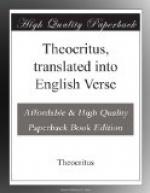Their monthly dole erewhile
unnumbered thralls
Sought in Antiochus’,
in Aleuas’ halls;
On to the Scopadae’s
byres in endless line
The calves ran lowing with
the horned kine;
And, marshalled by the good
Creondae’s swains
Myriads of choice sheep basked
on Cranron’s plains.
Yet had their joyaunce ended,
on the day
When their sweet spirit dispossessed
its clay,
To hated Acheron’s ample
barge resigned.
Nameless, their stored-up
luxury left behind,
With the lorn dead through
ages had they lain,
Had not a minstrel bade them
live again:—
Had not in woven words the
Ceian sire
Holding sweet converse with
his full-toned lyre
Made even their swift steeds
for aye renowned,
When from the sacred lists
they came home crowned.
Forgot were Lycia’s
chiefs, and Hector’s hair
Of gold, and Cycnus femininely
fair;
But that bards bring old battles
back to mind.
Odysseus—he who
roamed amongst mankind
A hundred years and more,
reached utmost hell
Alive, and ’scaped the
giant’s hideous cell—
Had lived and died: Eumaeus
and his swine;
Philoetius, busy with his
herded kine;
And great Laertes’ self,
had passed away,
Were not their names preserved
in Homer’s lay.
Through song alone may man
true glory taste;
The dead man’s riches
his survivors waste.
But count the
waves, with yon gray wind-swept main
Borne shoreward: from
a red brick wash his stain
In some pool’s violet
depths: ’twill task thee yet
To reach the heart on baleful
avarice set.
To such I say ‘Fare
well’: let theirs be store
Of wealth; but let them always
crave for more:
Horses and mules inferior
things I find
To the esteem and love of
all mankind.
But to what mortal’s
roof may I repair,
I and my Muse, and find a
welcome there?
I and my Muse: for minstrels
fare but ill,
Reft of those maids, who know
the mightiest’s will.
The cycle of the years, it
flags not yet;
In many a chariot many a steed
shall sweat:
And one, to manhood grown,
my lays shall claim,
Whose deeds shall rival great
Achilles’ fame,
Who from stout Aias might
have won the prize
On Simois’ plain, where
Phrygian Ilus lies.
Now, in their sunset home
on Libya’s heel,
Phoenicia’s sons unwonted
chillness feel:
Now, with his targe of willow
at his breast,
The Syracusan bears his spear
in rest,
Amongst these Hiero arms him
for the war,
Eager to fight as warriors
fought of yore;
The plumes float darkling
o’er his helmed brow.
O Zeus, the sire most glorious;
and O thou,
Empress Athene; and thou,
damsel fair,
Who with thy mother wast decreed
to bear
Rule o’er rich Corinth,




